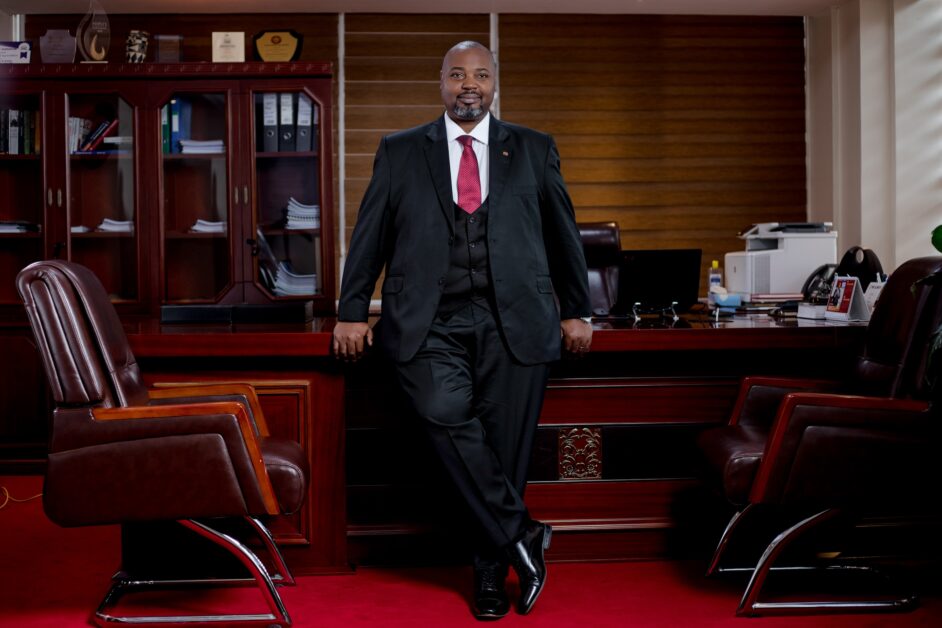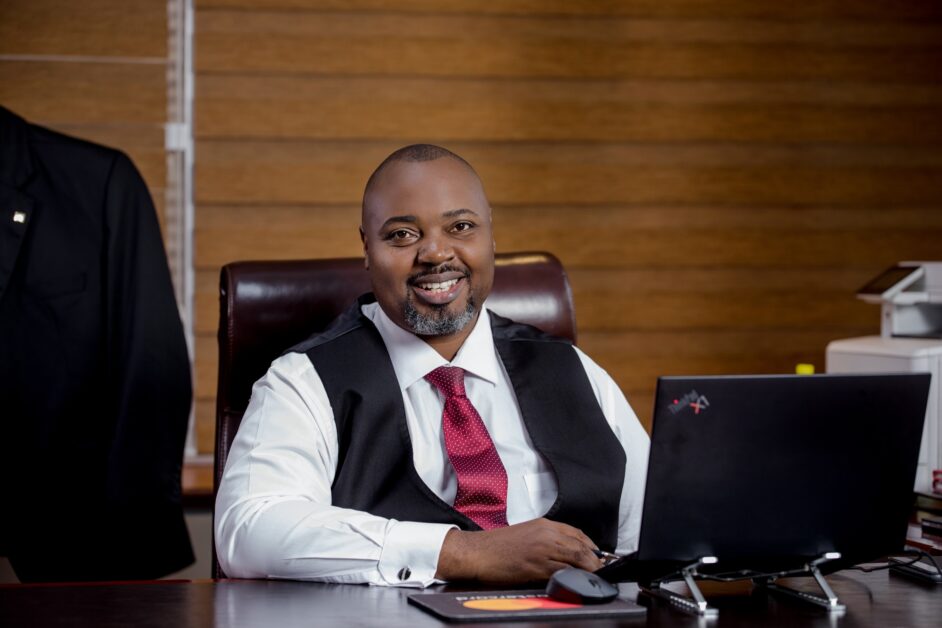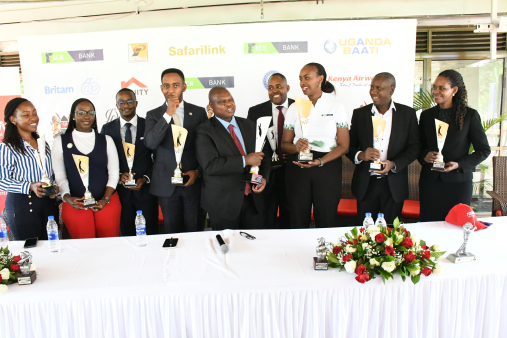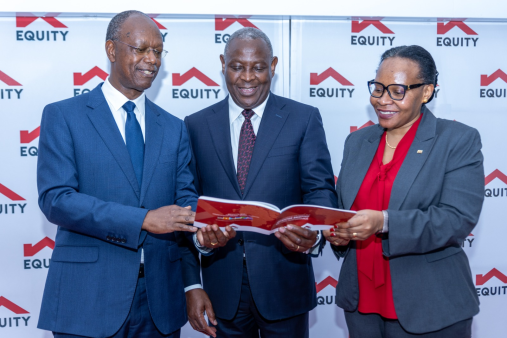With key growth in other investments, Equity Bank registered an 11.1% growth in assets- from UGX3.374 trillion to UGX3.748 trillion- a growth of UGX374.1 billion. This allowed the bank to move from being Uganda’s 4th largest bank by assets to the 3rd largest. The bank also held steady its 4th position in total income.
In this interview with CEO East Africa Magazine’s Muhereza Kyamutetera, Anthony Kituuka, the Bank’s Managing Director, contextualises the Bank’s 2023 performance and reassures stakeholders that the bank remains steadfast in its commitment to the holistic transformation of our home Uganda and Africa, as outlined in the Africa Recovery and Resilience Plan launched in 2022.
“The bank remains well-capitalized to withstand this loss and is compliant with all the other regulatory and statutory capital ratios,” said Anthony.
First, can you give us an overview of 2023? What were the key highlights for the bank? What were the key drivers of performance?
In 2023, we remained committed to our purpose of transforming lives, giving dignity, and expanding opportunities for wealth creation to Ugandans. We dedicated a large percentage of our investments to improving lives through the six pillars of driving growth and transforming lives in the areas of Food and Agriculture, Energy, Environment and Climate Change, Social Protection, Health, Education and Leadership Development, Financial Inclusion and Enterprise Development.
As you all know, deposits are the blood and the engine of every bank; so, from that perspective, our deposits mobilisation agenda was built around four key areas, namely:
- Ecosystem Banking: Given that Uganda was still emerging from Covid-19, to spur economic growth in the key sectors, our focus was more on providing short-term lending to bridge the immediate cashflow and working capital needs for businesses especially. Most traders needed working capital, so we focused on that, and ensuring that the value chain was well-serviced. For example, we looked at the value chains of such big players and multinationals such as breweries, soft drinks and other beverage companies, as well as other fast-moving consumer goods. We made sure that we gave working capital to the distributors and the stockists, and in that way, we supported in the stimulation of product demand for the big companies by ensuring that their distribution ecosystem can pay for products easily. This is important for sustaining job creation and growth as well as input demand across their value chains. With more working capital for distributors and stockists, they can increase their turnover, profitability and subsequently job creation which is good for the economy. True, we did experience challenges, especially with digital lending through our stock and float financing products. Regardless, ecosystem financing is still great and promising, and as earlier identified, the ecosystem financing worked in other manufacturing and distribution sectors- e.g breweries, soft drinks, cement, sugar, soap, cosmetics, petros, etc.
- Social Programmes: Our mission as a bank is around businesses, communities, and consumers. Our holistic approach to community looks at their entire livelihood- food, health, education, safety, and financial growth. Working with our partners like Mastercard, we were able to provide free financial literacy training to various communities, open accounts and then progress to financing them and growing with them. This was a key source of mutual growth. For example, in 2023 alone, 115,956 youth received free financial literacy training, 58% of whom were female.
- Agency and Digital Banking: Over and above our revolutionary USSD *247# driven banking, which is a great recruitment tool that saw our customer numbers grow past 2million, our over 9,000 EquiDuuka agents are an important tool in recruitment. These agents are community-based- they are the local shopkeepers in the neighbourhood. Because of the trust levels they carry- we have seen the ratio of deposits to transactions at agents reach 85% to 15%. In the spirit of shared prosperity, we share the commission on withdrawals, and we pay them for deposits.
- Branch Distribution: Of course, our 50 branches remain relevant, especially for rural and periurban areas. Much as we have digital banking for convenience, we ensured that the person who wants to go to the branches especially upcountry, still had that opportunity.
These are the key areas where our execution focused, and it paid off well especially in terms of deposits and customer growth. We also registered UGX185.26b in cash transfers to refugees; and a UGX130 billion loan portfolio to farmers/agriculture with 71,423 farmers reached. We also saw UGX15.12 billion in green loans disbursed for climate financing. Additionally, UGX3.6 billion in loans was disbursed to women-owned micro-enterprises and overall, 8452 jobs were created.
With this significant performance, we do understand the bank has reported a loss of UGX18.8 billion which is related to provisioning for what is classified as “bad and doubtful debts”. Can you explain what caused this; especially that in 2023, the bank had an impressive 21.4% growth in income from UGX469.2 billion to UGX569.6 billion- a growth of UGX100.4 billion?
First, while the Ugandan economy rebounded in 2023 and the Central Bank did a good job in trying to tame the inflationary tendencies, the economy still came under pressures driven by geo-political rivalry in Europe and the Middle East as well as erratic energy prices. These geopolitical challenges affected a couple of our clients in the milling business who rely on imported wheat.
Domestically, we also saw hitherto promising sectors such as government contracting face challenges due to delayed government payments. For example, there are customers who worked on certain roads but then the rains washed away the roads- and so they can’t be paid without a completion certificate. So really, we saw a lot of strain coming from that part of the contract financing product.

From the onset, our focus in 2023 was on catering to the short-term cashflow and working capital needs of businesses thus the ecosystem financing solution I talked about earlier. But to do it efficiently, we had to turn to digitalisation. We also saw some strain in this unsecured digital-based financing. Due to these challenges, we had to prudently disburse provision for them. This was the single biggest expense that weighed down our otherwise good performance in income.
Provisions for bad and doubtful debts grew from 90.7billion to 191.2 billion of which UGX84 billion covered the impact of digital lending fraud and our prudent provisioning stance on some key names. We continue to make significant progress towards recovery of the resultant delinquent loans and the outcome of these efforts shall be evident in our 2024 performance.
How does 2023, especially the challenges faced affect your 2024? Are we going to see a change in strategy?
We believe the economy will look up this year as per government projections and this will further stimulate more opportunities.
We also believe 2024 will be a very excellent, year because of the significant market share we have and continue to build as well as the firm foundation and significant market we have laid to take advantage of these opportunities. We shall continue executing relentlessly on our “transforming lives strategy”. We shall stay steadfast in our commitment to the holistic transformation of our home Uganda and Africa, as outlined in our Africa Recovery and Resilience Plan.
Central to this, is fostering inclusivity in which we aim to enhance economic and social inclusion by empowering productive households and facilitating financially robust value chains.
We have set a clear target: seek to amplify the impact of borrowing for businesses and consumers alike. By facilitating access to credit, we aim to catalyse value chain expansion and job creation for businesses while simultaneously enabling households to pursue their aspirations and improve their livelihood through consumer borrowing.
Furthermore, we are also dedicated to directing a greater portion of our loan portfolio towards vital sectors such as agriculture, manufacturing and MSMEs, recognising their pivotal role in driving sustainable development.
The Bank remains well-capitalised to withstand this loss and is compliant with the regulatory and statutory ratios. Despite the results of the commercial engine of the Bank, we still maintain our commitment to our Social Investments, that catalyse our purpose to transform lives, give dignity and expand opportunities for wealth creation.
We are still big on digital lending and as much as there has been reported abuse, we cannot run away from changing the world, because that is who we are. It is in our mission and DNA. But of course, we will be more prudent.

It is important that the bank remains grounded and committed to “changing the world, because that’s who you are”, even if you have taken some beatings here and there, you are not giving up because you think the growth potential lies in the uncharted waters. When you compare, especially the six pillars that the bank stands on as well as the key components of the Africa Recovery and Resilience Plan launched in 2022 and the key sectors identified under Uganda’s National Development Plan, what are some of the areas that you say Equity Bank does so well perhaps better than everybody else in the industry?
The Africa Recovery and Resilience Plan has several sectors, namely, mining and extractives, agriculture, MSMEs, digitisation as well as oil & gas and then environmental transformation. I believe we will do very well in MSMEs, Food and Agriculture, trade, and then technology-enabled ecosystems (digitisation). Why is that? If you want to try and touch 100 million customers, or in our case for Uganda, 9 million customers, there is no better way to do it, than technology, which then makes partnerships with mobile money and other fintechs very important and we must find a safe way to do it.
Regarding social and environmental transformation, we have a very good deal of support from our parent company. And I think we have an opportunity to take the lead there. We are seeing increasing interest in green areas and green financing, and we have been able to disburse a couple of loans- UGX15.12 billion in 2023, but there needs to be significant pushing in creating awareness. I think that’s an area that we can do very well. We for example recently won the award for being an ESG bank. But we did because that’s an area I believe we can do very, very well.
Then MSMEs: our businesses need a lot of capital. Our strength as Equity Bank is credit. The opportunity is to do the whole holistic ecosystem banking around the MSMEs and their owners- we don’t want them to get only a loan from us. We want them to do all their transactions with us; we want their children to be part of the Equity Leadership Programme; we want to train their people in terms of financial literacy and so much more. Those are all the things that we would really like to do holistically, that’s the opportunity for the bank and we have several products for all that. There are so many products that we have, that can support the SMEs, the microbusinesses, and the individual persons behind them. And we shall continuously invest in digitising all these processes to become more efficient, faster, and affordable. That’s why for us, a technology-enabled ecosystem is something very important. The only thing that we must do is to do it safely.

 Tight Rules, Big Money: Energy Ministry Restricts Gold Trade to Licensed Operators as Central Bank Enters a UGX 20 Trillion Market
Tight Rules, Big Money: Energy Ministry Restricts Gold Trade to Licensed Operators as Central Bank Enters a UGX 20 Trillion Market 


